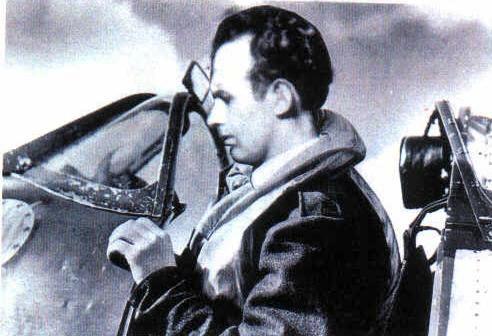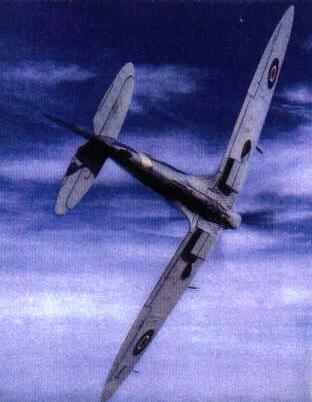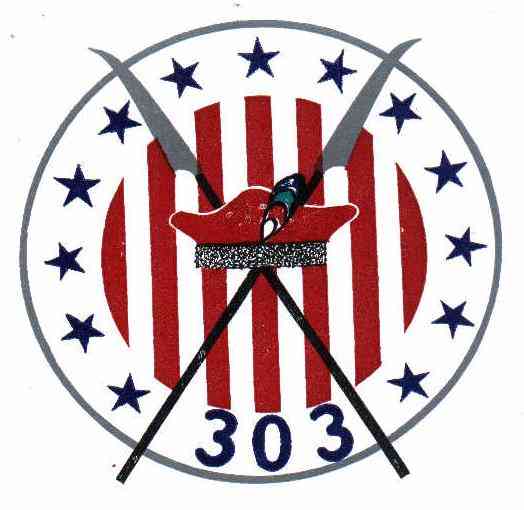Captain WITOLD ALEKSANDER HERBST
The Polish fighter pilot of the legendary Squadron 303 that participated in
the Battle of Britain.
To invade Great Britain in 1940 it was essential for Germans
to gain complete superiority over the British air space. They started
preparations to their landing in British Islands by massive air attacks and this
was met by not necessarily well prepared British Royal Air Force (RAF). One
important weakness that British faced at that time was a lack of pilots. This
problem was in part solved by using a large pool of experienced Polish pilots,
who after Hitler’s invasion of Poland in September 1939 managed to escape
through southern Europe and arrived first in France and later in England.
Captain Herbst was among them.

On his "Spitfire" Captain Herbst escorted bombing raids of the Allied
Airforces over Germany and occupied Europe.
|
|
By mid-1943 there were nine Polish fighter squadrons, one
night fighter squadron, four bomber and one army cooperation squadron, all with
their Polish ground personnel, own flying schools and support unit. In the end
of 1942 the total number of Polish airmen was at the level of 14,000 people
including Polish pilots and personnel serving in British units. There were many
squadrons with pilots from Poland, France, Czechoslovakia, Norway, Belgium and
Holland. Polish was by far the largest contingent, outnumbering all the others
combined.
First Polish manned fighter squadrons formed in UK were
Squadrons 302 and 303. They, with other Polish squadrons have played a
significant role in defense of England and in escorting Allied Forces’ air
attacks on Europe occupied by Germans. For example, in the first thousand bomber
raid on Cologne almost one hundred aircraft were Polish manned. Capt.. Herbst took
part in many of such raids.
303. They, with other Polish squadrons have played a
significant role in defense of England and in escorting Allied Forces’ air
attacks on Europe occupied by Germans. For example, in the first thousand bomber
raid on Cologne almost one hundred aircraft were Polish manned. Capt.. Herbst took
part in many of such raids.
During the Battle of Britain (August – early October 1940)
Polish squadrons have shot down approximately 200 German aircraft of which
Squadron 303 has contributed with 126. The next highest scorer was the British
squadron that shot down about 50 enemy’s aircraft. Germans lost the Battle of
Britain with over 1600 German aircraft downed with most of their crews. The
price of the victory was also high: RAF’s losses were about 900 aircraft
although 1/3 of their pilots were saved.
During the II WW Polish fighter pilots operating from Britain
only shot down 750 German aircraft, plus 250 aircraft probably. Polish personnel
losses were over 2,000 fighter pilots and bomber air crews and 700 lost in
accidents and training. About 75% of the Polish airmen that lost their lives
were bomber crews (British bomber had a crew of six to seven).
Capt.
Witold. Alexander Herbst graduated from the Polish Air
Force Academy in Deblin. He flew in Polish squadrons 308 and 303 in the RAF
(1942-1944).
| Coat of
Arms used by the 303 (Polish) Fighter Squadron in Great Britain 1940 -
1944. It was inherited from the Kosciuszko Squadron established in
1919 and operated primarily by American fighter pilots serving as
volunteers in the Polish Air Force. That Squadron contributed
significantly to the final victory of Poland against Bolsheviks during
Polish - Soviet War (1919 - 1920). |
 |
During his service in Great Britain Capt. Herbst made 141 missions
on "Spitfires" both in patrols and when protecting British and
American bomber raids over Germany. He took part in air raids during the
Invasion of Normandy by Allied Forces. For his heroism and achievements Capt.
Herbst received Polish Cross of Valor (three times) and a number of British
decorations. After the war ended he immigrated to the United States. He is the author of an
excellent autobiographic book "Under British Sky" published in 1997 (in Polish).
Capt. Herbst has been living with his wife Doreen in Edmonds, State of
Washington, U.S.A. and has been a long time member of the Polish Home
Association in Seattle.
Prepared by:
Prof. Vlad M. Kaczynski,
University of Washington, 3/18/2000


 303. They, with other Polish squadrons have played a
significant role in defense of England and in escorting Allied Forces’ air
attacks on Europe occupied by Germans. For example, in the first thousand bomber
raid on Cologne almost one hundred aircraft were Polish manned. Capt.. Herbst took
part in many of such raids.
303. They, with other Polish squadrons have played a
significant role in defense of England and in escorting Allied Forces’ air
attacks on Europe occupied by Germans. For example, in the first thousand bomber
raid on Cologne almost one hundred aircraft were Polish manned. Capt.. Herbst took
part in many of such raids.